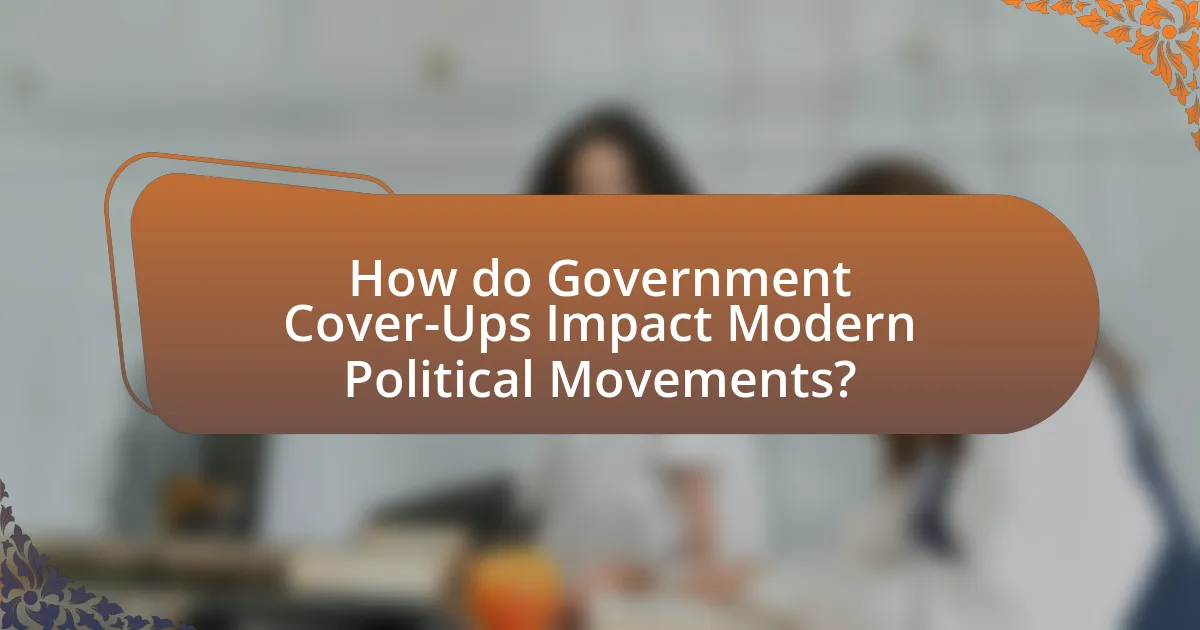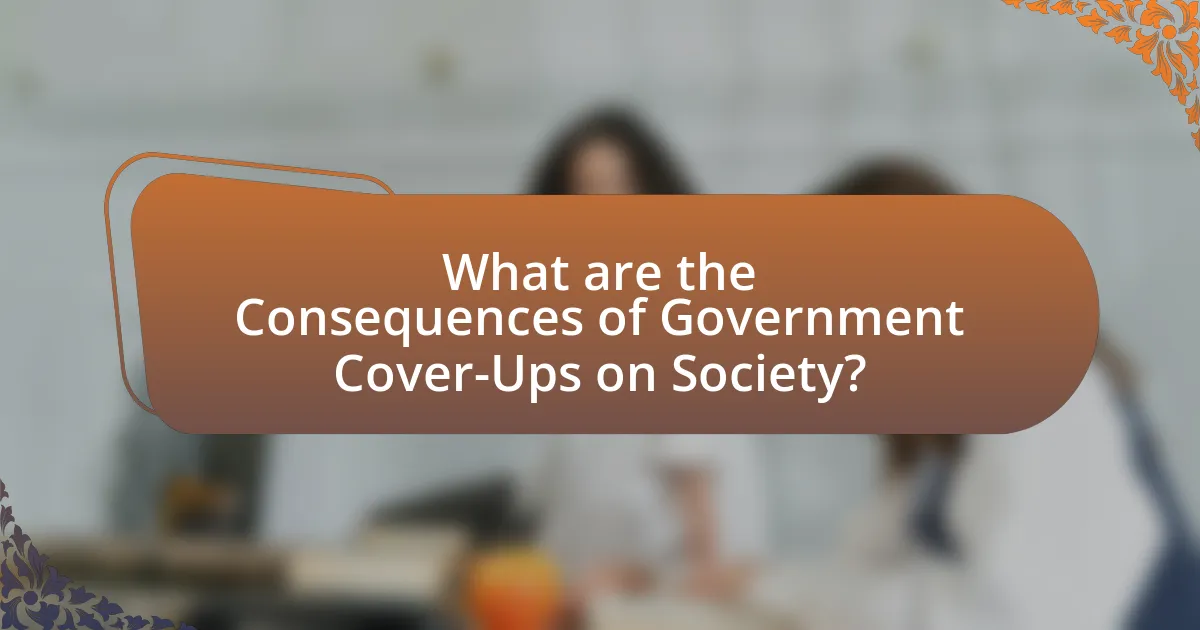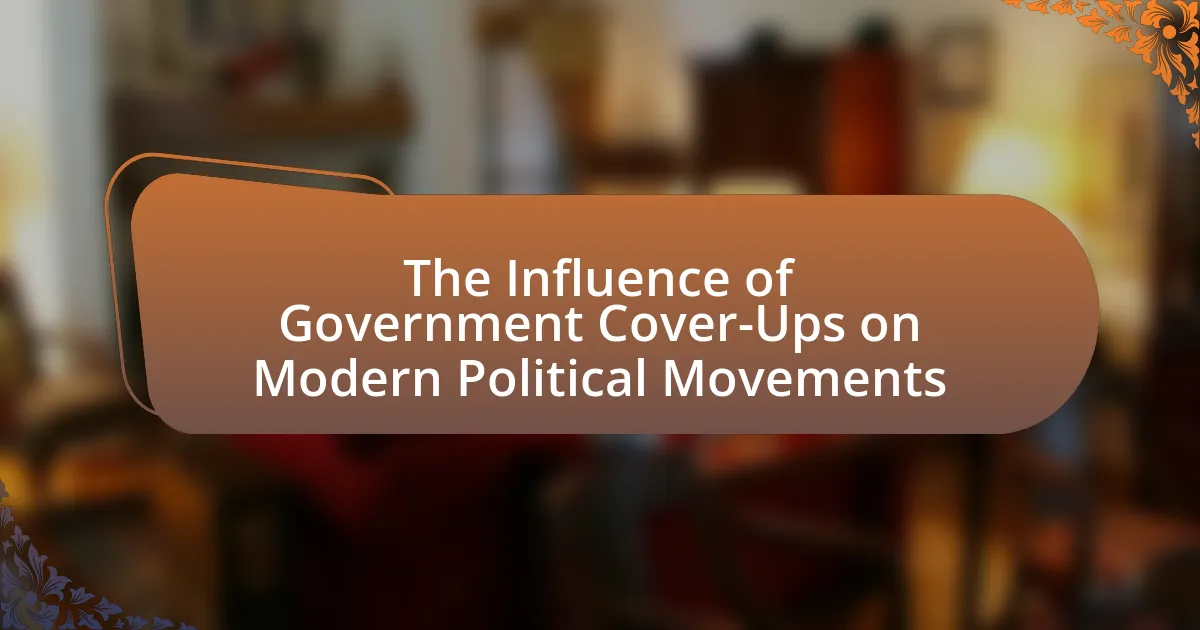Government cover-ups are intentional actions by authorities to hide information or actions from the public, often linked to scandals or misconduct. Historical examples, such as the Watergate scandal and the Tuskegee Syphilis Study, illustrate how these cover-ups can erode public trust and catalyze political movements. The article examines the impact of government cover-ups on modern political activism, highlighting how they foster distrust in institutions, influence civic engagement, and shape the strategies of movements demanding transparency and accountability. It also discusses the motivations behind these cover-ups and the long-term consequences for society and governance.

What are Government Cover-Ups and Their Historical Context?
Government cover-ups are deliberate efforts by authorities to conceal information or actions from the public, often related to scandals, misconduct, or sensitive events. Historically, notable examples include the Watergate scandal in the 1970s, where the Nixon administration attempted to hide its involvement in a break-in at the Democratic National Committee headquarters, leading to significant political repercussions and a loss of public trust in government. Another example is the Tuskegee Syphilis Study, where the U.S. Public Health Service misled African American men about their treatment for syphilis, resulting in long-lasting impacts on public health policy and community trust. These instances illustrate how government cover-ups can shape political movements and influence public perception of authority.
How have government cover-ups shaped public perception?
Government cover-ups have significantly shaped public perception by fostering distrust in authorities and institutions. Historical examples, such as the Watergate scandal in the 1970s, revealed the extent to which government officials could manipulate information, leading to widespread skepticism about political integrity. This erosion of trust has been documented in surveys, where a 2019 Gallup poll indicated that only 17% of Americans expressed trust in the federal government to do what is right. Such cover-ups often catalyze social movements, as seen with the Vietnam War, where revelations about government deception spurred anti-war protests and a demand for transparency. Consequently, the pattern of government cover-ups has created a climate where citizens are more likely to question official narratives, influencing modern political movements and activism.
What are some notable historical examples of government cover-ups?
Notable historical examples of government cover-ups include the Watergate scandal, the Iran-Contra affair, and the Tuskegee syphilis study. The Watergate scandal involved a break-in at the Democratic National Committee headquarters and subsequent efforts by the Nixon administration to conceal its involvement, leading to President Nixon’s resignation in 1974. The Iran-Contra affair revealed that the Reagan administration secretly facilitated arms sales to Iran to fund Contra rebels in Nicaragua, violating congressional prohibitions. The Tuskegee syphilis study, conducted from 1932 to 1972, involved the unethical treatment of African American men who were misled about their health status and denied treatment for syphilis to study the disease’s progression. These examples illustrate significant breaches of public trust and have had lasting impacts on political accountability and public perception of government actions.
How did these cover-ups influence political trust?
Government cover-ups significantly erode political trust by fostering skepticism and cynicism among the public. When citizens discover that their leaders have concealed information or misled them, it creates a perception of dishonesty and unaccountability. For instance, the Watergate scandal in the 1970s led to a dramatic decline in trust towards the U.S. government, with public approval ratings for Congress dropping from 42% in 1974 to 27% in 1975, illustrating the long-lasting impact of such cover-ups on public confidence. This erosion of trust can result in decreased civic engagement and increased polarization, as individuals become disillusioned with the political system and more likely to support radical movements or alternative political ideologies.
Why do governments engage in cover-ups?
Governments engage in cover-ups primarily to protect their interests, maintain public order, and avoid accountability. By concealing information, they aim to prevent political fallout, safeguard national security, or shield officials from scrutiny. Historical examples include the Watergate scandal, where the Nixon administration attempted to hide its involvement in a break-in to protect its political power, and the Iran-Contra affair, where the Reagan administration concealed arms sales to Iran to fund Contra rebels in Nicaragua, demonstrating the lengths to which governments will go to manage public perception and political stability.
What motivations drive governments to conceal information?
Governments conceal information primarily to maintain power and control over public perception. This motivation often stems from the desire to prevent public panic, protect national security, or shield political leaders from accountability. For instance, during the Watergate scandal, the U.S. government attempted to hide its involvement in illegal activities to preserve the Nixon administration’s legitimacy. Additionally, governments may conceal information to manipulate narratives, as seen in various regimes that suppress dissenting views to maintain stability. Such actions can lead to a significant erosion of trust between the government and its citizens, impacting political movements and public engagement.
How do political agendas influence the decision to cover up?
Political agendas significantly influence the decision to cover up by prioritizing the preservation of power and public image over transparency. When political leaders face scandals or controversies that threaten their authority or the stability of their administration, they may opt for cover-ups to mitigate damage and maintain control. For instance, the Watergate scandal in the 1970s exemplifies how President Nixon’s administration engaged in a cover-up to protect its political standing, ultimately leading to Nixon’s resignation. This demonstrates that political agendas often drive decisions to conceal information, as leaders seek to avoid accountability and safeguard their positions.

How do Government Cover-Ups Impact Modern Political Movements?
Government cover-ups significantly impact modern political movements by eroding public trust in institutions and fueling activism. When citizens perceive that their government is concealing information, such as in cases like the Watergate scandal or the Iraq War intelligence manipulation, it often leads to widespread disillusionment and mobilization against perceived injustices. This discontent can catalyze movements, as seen with the rise of groups like Occupy Wall Street and Black Lives Matter, which emerged partly in response to government actions perceived as deceptive or oppressive. The distrust generated by these cover-ups can also lead to increased scrutiny of government actions, prompting demands for transparency and accountability, which are central themes in many contemporary political movements.
What role do cover-ups play in the emergence of political movements?
Cover-ups significantly contribute to the emergence of political movements by fostering public distrust in government institutions. When governments conceal information or mislead the public, it often leads to widespread outrage and mobilization among citizens who feel betrayed. For instance, the Watergate scandal in the 1970s revealed extensive cover-ups by the Nixon administration, which galvanized public support for political reform and accountability, ultimately leading to significant changes in U.S. governance. This pattern is observable in various historical contexts, where the exposure of cover-ups has acted as a catalyst for collective action, as seen in movements like the Arab Spring, where government repression and misinformation spurred widespread protests against authoritarian regimes.
How do citizens respond to perceived government dishonesty?
Citizens typically respond to perceived government dishonesty by increasing their skepticism towards government institutions and engaging in political activism. Research indicates that when citizens believe their government is dishonest, they are more likely to participate in protests, join advocacy groups, or support alternative political movements. For example, the Watergate scandal in the 1970s led to widespread public distrust in the U.S. government, resulting in a surge of civic engagement and the formation of various watchdog organizations aimed at promoting transparency and accountability. This pattern of response highlights the significant impact that perceived dishonesty has on citizen behavior and political dynamics.
What examples illustrate the connection between cover-ups and political activism?
Examples illustrating the connection between cover-ups and political activism include the Watergate scandal and the Iran-Contra affair. The Watergate scandal, which involved a break-in at the Democratic National Committee headquarters and subsequent cover-up by the Nixon administration, led to widespread political activism, including protests and calls for accountability, ultimately resulting in Nixon’s resignation in 1974. Similarly, the Iran-Contra affair, where the Reagan administration secretly facilitated arms sales to Iran to fund Contra rebels in Nicaragua, sparked significant public outrage and activism, leading to congressional investigations and increased scrutiny of executive power. These events demonstrate how government cover-ups can mobilize citizens and catalyze political movements demanding transparency and reform.
How do cover-ups affect the strategies of political movements?
Cover-ups significantly alter the strategies of political movements by undermining public trust and prompting increased scrutiny. When a government engages in a cover-up, it often leads to heightened skepticism among citizens, which political movements can leverage to galvanize support and mobilize protests. For instance, the Watergate scandal in the 1970s not only damaged the Nixon administration but also energized political activism, leading to reforms in campaign finance and government transparency. This historical context illustrates how cover-ups can serve as catalysts for political movements, compelling them to adopt strategies focused on transparency and accountability to counteract the erosion of trust caused by the initial deception.
What tactics do movements use to expose government cover-ups?
Movements use tactics such as grassroots organizing, investigative journalism, and social media campaigns to expose government cover-ups. Grassroots organizing mobilizes community members to raise awareness and pressure officials for transparency, as seen in movements like the Watergate scandal protests. Investigative journalism uncovers hidden information through in-depth reporting, exemplified by the work of journalists like Bob Woodward and Carl Bernstein. Social media campaigns amplify messages and gather public support, allowing movements to reach a wider audience quickly, as demonstrated by the #MeToo movement. These tactics collectively create a powerful platform for accountability and transparency.
How do social media and technology facilitate these movements?
Social media and technology facilitate modern political movements by enabling rapid information dissemination and fostering community engagement. Platforms like Twitter and Facebook allow activists to share real-time updates, mobilize supporters, and organize events, significantly increasing visibility and participation. For instance, during the Arab Spring, social media was instrumental in coordinating protests and spreading awareness about government actions, leading to widespread mobilization across multiple countries. Additionally, technology provides tools for secure communication and data sharing, which are crucial for organizing movements that may face government repression. The ability to bypass traditional media channels empowers grassroots organizations to amplify their messages and reach a global audience, thereby enhancing the impact of their movements.

What are the Consequences of Government Cover-Ups on Society?
Government cover-ups lead to a significant erosion of public trust in institutions. When citizens discover that their government has concealed information, it fosters skepticism and cynicism towards political leaders and agencies. For instance, the Watergate scandal in the 1970s resulted in a profound distrust of the U.S. government, contributing to a decline in voter turnout and increased political apathy. Additionally, cover-ups can incite social unrest, as seen in the case of the Tuskegee Syphilis Study, where the revelation of unethical practices led to widespread outrage and calls for reform in medical ethics. Ultimately, these consequences can destabilize societal cohesion and hinder democratic processes.
How do cover-ups influence public trust in government institutions?
Cover-ups significantly erode public trust in government institutions by fostering skepticism and cynicism among citizens. When governments engage in concealment of information, such as the Watergate scandal in the 1970s, it leads to a perception that officials prioritize self-interest over transparency and accountability. This perception is supported by studies indicating that trust in government declines following revelations of misconduct or deception, as seen in the aftermath of the Iraq War, where misleading information about weapons of mass destruction diminished public confidence in political leaders. Consequently, the prevalence of cover-ups can create a long-lasting impact on civic engagement and the legitimacy of governmental authority.
What are the long-term effects on civic engagement?
Long-term effects on civic engagement include increased political participation, heightened awareness of social issues, and a stronger sense of community responsibility. Research indicates that individuals who experience or learn about government cover-ups often become more motivated to engage in political processes, as evidenced by the rise in voter turnout and activism following significant events like the Watergate scandal. Studies show that civic engagement can lead to more informed citizens who are likely to advocate for transparency and accountability in governance, thereby fostering a more active and participatory democracy.
How do cover-ups affect the relationship between citizens and their government?
Cover-ups significantly erode trust between citizens and their government. When governments engage in cover-ups, they often conceal information that is crucial for public awareness, leading to a perception of dishonesty and manipulation. For instance, the Watergate scandal in the 1970s resulted in a profound loss of trust in the U.S. government, as citizens felt betrayed by the administration’s attempts to hide its involvement in illegal activities. This distrust can lead to increased public skepticism, lower civic engagement, and a rise in political activism aimed at accountability. Studies have shown that transparency is essential for maintaining a healthy relationship between citizens and their government; when transparency is compromised, citizens are more likely to question the legitimacy of governmental actions and policies.
What lessons can be learned from the influence of cover-ups on political movements?
Cover-ups significantly undermine public trust in political movements, demonstrating that transparency is crucial for legitimacy. Historical examples, such as the Watergate scandal, illustrate how concealment of information can lead to widespread public outrage and mobilization against the government. The fallout from Watergate not only resulted in President Nixon’s resignation but also catalyzed a wave of political activism and reforms aimed at increasing government accountability. Additionally, the Iran-Contra affair revealed how government deception can provoke intense scrutiny and opposition, ultimately leading to legislative changes. These instances highlight that political movements thrive on trust and transparency, and when cover-ups are exposed, they can galvanize public action and demand for reform.
How can citizens hold governments accountable for transparency?
Citizens can hold governments accountable for transparency by actively engaging in advocacy, utilizing legal frameworks, and leveraging technology for information access. Advocacy groups, such as Transparency International, work to promote accountability and transparency standards globally, influencing policy changes. Legal frameworks, like the Freedom of Information Act in the United States, empower citizens to request government documents, ensuring access to information. Additionally, technology enables citizens to share information and mobilize public opinion through social media platforms, amplifying calls for transparency. These methods collectively enhance citizen oversight and pressure governments to operate transparently.
What best practices can political movements adopt to combat cover-ups?
Political movements can adopt transparency, grassroots mobilization, and strategic alliances as best practices to combat cover-ups. Transparency involves openly sharing information and encouraging whistleblowers to come forward, which can expose hidden agendas and foster public trust. Grassroots mobilization empowers citizens to demand accountability and engage in collective action, as seen in movements like the Arab Spring, where widespread protests revealed government corruption. Strategic alliances with independent media and civil society organizations can amplify voices and provide resources for investigations, as demonstrated by the collaboration between investigative journalists and activists in uncovering the Watergate scandal. These practices collectively enhance the ability of political movements to challenge and dismantle cover-ups effectively.
